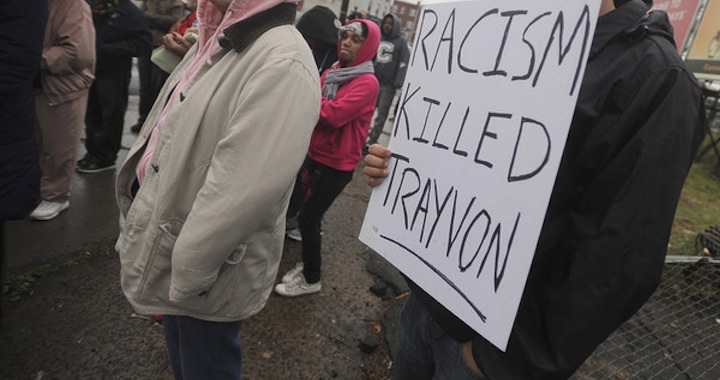It continues even now. The group emails and facebook posts spotlighting incidents of black on white violence and the cries, “Where’s the outrage now like there was over Trayvon Martin’s death at the hands of George Zimmerman! Why isn’t the President speaking out now?” And each time the comparison offered shows a total lack of understanding about why Martin’s killing was different.
No doubt there have been acts of violence more horrible than Trayvon Martin’s case. And no doubt there is black on white violence as well as white on black violence, though most killings by far involve people of the same race. And certainly innocent people of all races have been killed.
Still there are differences in Zimmerman’s killing of Martin, differences that rightly led to the national attention.
The day after the court decision I was in Orlando, Florida where I was visiting with two men –one of them a minister- who were attending the NAACP national meeting. “It wouldn’t have gone down this way if Zimmerman was black and Trayvon was white, ” remarked one of them. “The police wouldn’t have failed to arrest an armed black man who tracked down an innocent white kid, caused a fight with him and then pulled out a gun and killed him. The police would likely shot the black man right there.”
No one can know for sure what the police would have done. But the scenario the man described is not at all farfetched. And it wouldn’t have made national news. Unfortunately, many white people –like those who make the questionable comparisons- have not even considered the matter from the perspective of a black man. (1) A young black man had done nothing wrong. (2) He was tracked down by an armed man of another race for no other reason than that the young man was black and therefore viewed with suspicion as a white young man would not normally have been. (3) The armed man provoked an unnecessary confrontation. (4) In the midst of a fight the armed man pulled out his weapon and killed the innocent black young man. (5) Police did not arrest the killer until there was a public outcry. (6) When the killer when to trial, he was declared “Not Guilty.”
Related: Finding Justice for Trayon: 7 Action Steps for our Outrage – by Kristen Howerton
Those who object to the attention given to the killing of Trayvon Martin and who continue to post stories of doubtful similarity to Martin’s case on Facebook or send them in emails fail to see that those six characteristics are essential to the whole issue. Too many people the attention given to Zimmerman’s killing are simply in denial about enduring and still pervasive problem woven into the nation’s social fabric: racism.
I’m hesitant to simply label all these people as racists who point to other incidents of violence and make questionable comparisons. But I do believe a certain kind of moral myopia is at work, hindering their ability to see what’s going on. What appears as racism is often an expression of a broader problem: the failure to have sufficient empathy and compassion for people outside of one’s own circle, not only of race, but of class, nationality, sexual orientation and others crucial aspects of identity. This failure accounts for the apparent inability of some to even begin grasp the real issues at stake when discrimination and inequality come into play and even to blame the victims who are not like him or herself.
Sadly, this failure is far too prevalent among American Christians. Love, kindness, and compassionate understanding are present in them. But they don’t extend it in fullness to those who are not like them. Jesus sought to address this problem in the parable of the Good Samaritan (Luke 10:25-37). Loving our neighbors involves more than care for people who are like us. The circle of care and understanding must extend even to people who have been perceived as at odds with “our kind” of people. Suspicion must be put aside.
Also by Craig: Peace of Mind and the Prophetic Pursuit of Peace and Justice
This matter is beyond racism. The failure to have sufficient empathy and compassion for people outside of one’s own circle, not only of race, but of class, nationality, and sexual orientation is a failure of moral imagination. We can’t “weep with those who weep and rejoice with those who rejoice” (Romans 12:15 ) if we can’t or won’t get out of our own shoes and imagine ourselves in their place. More likely we will minimize their suffering and troubles or attribute the misfortune to the people’s own personal flaws. We will insensitively judge and tend to be self-righteous.
Attitudes toward the poor among many people in the United States display this same lack of empathy and compassion. Too many blame the poor for their plight and assume their problems are the result of laziness or moral failings. In other words, they blame the victims rather than seek to sympathetically understand the struggles and suffering of those who are disadvantaged. Self-righteous judgmentalism overshadows merciful traits found in the way Jesus dealt with the poor.
Christians will not be agents of reconciliation and healing as long as they see the world from the perspective of the privileged or fail to even attempt to see from the viewpoints for those who are unlike themselves in important ways. We have a higher calling than simply to be representative of our race, class, nationality or whatever else defines us in this world. “As God’s chosen ones, holy and beloved, clothe yourselves with compassion, kindness, humility, meekness, and patience” (Colossians 3:12).

